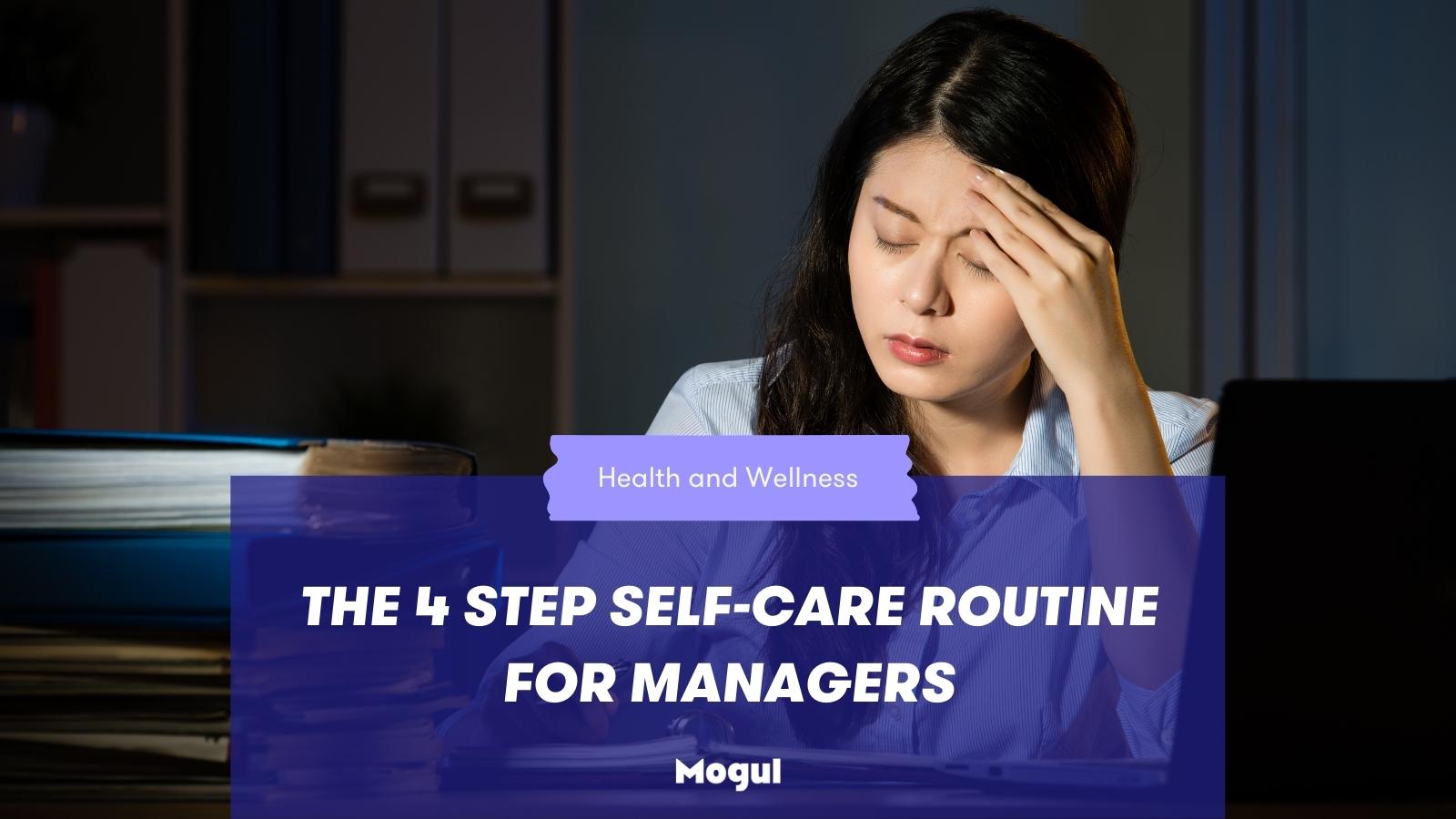The 4 Step Self-Care Routine For Managers

During uncertain times, it's essential to focus on the things we can control.
As humans, we're conditioned to care for others before ourselves.
But lack of self-care over long durations can cause physical ailments like headaches, stomach aches, intestinal issues, insomnia, and can lead to burnout.
These physical symptoms are your body's cry for attention and your mind's way of demanding self-care.
Self-care is a daily commitment.
By adding self-care into your daily schedule, you will have more energy, feel more optimistic, and be more capable of helping others.
Here are our four steps to ensure you are feeling your best.
1. Lean on your community
Your community is your first lifeline.
We're living through challenging times, and it's never been more important to find a community that can lift us when needed most.
Can’t meet people in person? There are an endless amount of benefits to joining online communities:
- Exclusive educational content
- Mentorship opportunities
- Access to networking events
- A place to share insights and ask for advice
- A sense of shared goals or mission.
Research shows that participating in a community and collaborating with others can provide a sense of meaning in one's life and ultimately lead to fulfillment.
Altruistic behavior activates the same areas in the brain linked to reward. That means participating in your community can support personal happiness and inner growth.
Often, a quick connection can lead to the collaboration and connection your brain is seeking.
It's never been more socially acceptable to connect with someone online and meet over a video conference, so reach out to someone who seems interesting or knowledgeable.
2. Build on the proper foundation
Self-care starts with sleep. Feeling more effective tomorrow begins with what you do tonight. Sleep impacts everything from our mental health to our physical performance.
According to Rafael Pelayo, a clinical professor of psychiatry and behavioral sciences and sleep specialists at the Stanford Sleep Medicine Center, sleep deprivation prevents the brain from cleaning out waste products at night from the energy it uses throughout the day.
If the brain doesn't dispose of waste products while you sleep, you may lose concentration, feel irritable, have skewed judgment, or be more forgetful the next day.
For better sleep, give yourself time to ramp down your day and relax your nervous system.
Take a warm shower, drink sleepytime tea, and read for 30 minutes. After that, pick the time you want to sleep, and then give yourself at least an hour in advance to settle your mind.
3. Be mindful of your self-talk
We release stress hormones within minutes of waking up in the morning. So even thinking about our to-do list when not fully awake can trigger a fight-or-flight response.
Starting the day triggered by stress can lead to more defensive and negative self-talk. And where the mind goes, the body follows.
Negative self-talk is a universal mental health challenge.
According to the National Science Foundation, the average person has about 12,000 to 60,000 thoughts throughout a day.
Of those thousands of thoughts, many people experience 80 percent of their thoughts as negative.
Reversing the negative narratives in your head and replacing them with positive self-talk can profoundly affect your mental and physical health.
The Mayo Clinic reports that intentional positive self-talk can increase your lifespan, lower your rates of depression and distress, improve your immune defenses, enhance your cardiovascular health, and generally enrich your psychological and physical well-being.
Throughout your day, try to catch negative thought patterns in their tracks.
Recognize every thought for what it is. When negative, acknowledge the negative thought and say, "this is a story I'm telling myself, and it's not true."
If you can get to know your negative thought patterns and what triggers them, you can start managing your mindset and deliberately redirecting your thoughts (and the reactions that follow).
You can also work to encourage more positive thought patterns by consciously starting your day with affirmative self-talk.
4. Get outside and stay grounded
The natural world around us is an incredible wonder and crucial to a self-care routine.
Exposure to nature calms the mind and provides lasting benefits.
Spending time outdoors has been shown to have positive, material effects, including improved sleep and increased self-esteem.
Mathew White of the European Centre for Environment & Human Health at the University of Exeter in England researches the interplay of ecology and psychology.
In a study of 20,000 people, he learned that two hours outside is the positive tipping point for better health and psychological well-being.
White recommends spending at least 120 minutes — all at once or over the course of a week — outside.
If you're like most busy professionals, try fitting in a short walk right after lunch to help stave off afternoon drowsiness and increase your energy levels.
Find your flow
Remember, a self-care routine is a daily commitment.
Nobody will be perfect every day. So it's important to be kind to yourself in difficult moments.
The key to a self-care routine is to stay disciplined, find your optimal amount of sleep, focus on your mindset, and find your community that will help unlock your greatest potential.
---
We’d like to thank Julie Wald, founder and Chief Wellness Officer of Golden for providing the latest research on health and wellness for this article.
Ready to find your next community? Joining the Mogul community gets you exclusive access to both our community of peers and mentors and to our community events.


